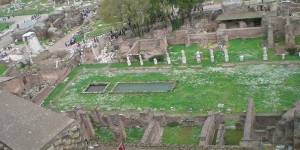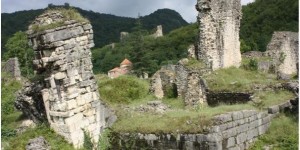Doing a degree in archaeology really is for people who like digging holes. We learn to dig to our hearts content in a practical sense; by freezing to the bone in a muddy field, full of beautiful trinkets of massive importance to another, more important academic and, of course, we are given no credit. We are but the mere grunts of the archaeological world. However we are also digging another more significant hole, that which is a deep and dangerous pit of a theoretical manner. Just out of curiosity who amongst you saw the word 'theoretical' and lost interest? I realise I was the one who used the word theoretical, but this is what I'm getting at: Why are issues of philosophy and social responsibility shunned in favour of morbid material based obsession? And more importantly; why are we not given an explanation?
When it comes to the political side of archaeology one of the major issues raised again and again is that we, the future of archaeology, the students young and fresh, are a symbol of imperialism. We are British trained and tutored and constantly encouraged to travel to other nations and continents to 'experience' other cultures. My problem is this; our tutors with their western enthusiasm focus on how we can benefit archaeology. Compare this to the people in the countries whose heritage we are expected to dominate viewing us with scepticism and an anticipation verging on dread. Were you aware of this? I wasn't until I read it for myself in numerous papers and books. Surely this is a more pressing issue than the correct technique for wielding a trowel!? I believe that archaeology is a particularly arrogant discipline - through archaeology we can know everything about everyone because we have radiocarbon dating and morphology and isotope analysis and other miracles at our disposal. Arm this with a degree and a massive bibliography and BOOM you have a virtual walking encyclopaedia. This is an unreasonable attitude, to say the least, and yet it is taught to us. I don't mind people being passionate about what they are interested in but the thought of how anybody can care more about academia than they do the emotional concerns of other human beings is disturbing. More importantly why do we, the students, not recognise let alone challenge this!? In one of my more sinister flights of fantasy I think of reasons why we are not told. Are we trained to ignore our social and political responsibility? After all, that would result in a more neutral, scientifically objective approach to our trinket collecting.
If this doesn't seem bad enough then consider this - in my experience as an archaeology student the theory of the discipline is not only mistreated by elements of the senior establishment itself but also by undergraduates. Studying theory is seen as tedious - which it is - but also as inconsequential, which it definitely isn't. I don't want to drag this article down into the dark and mostly inaccessible (courtesy of the archaeological elitists) world of theory but to sum up what I have witnessed - archaeology is a social discipline and it has consequences and implications far beyond the boundaries of a muddy, grunt infested site. I wouldn't have a problem with people disputing this if the reason was unknown, but it is obvious. The discipline of archaeology focuses more on the material than the social and political because it is a western academic institution. It is a product of its culture and time. The most depressingly ironic fact is this; for a discipline which studies the progression of culture and the changes that occur throughout time, archaeology is so slow in advancing. It reviews how time amongst other factors affects all aspects of humanity and yet refuses to be affected itself. This is because the materialistic mentality of archaeology is absolute thanks to its western roots, trunk and branches. Sadly this ingrains itself every year in the new fruit crop: us.
When I consider all of the above I wonder why I'm allowing it to happen. It's true that if I want a degree at the end of my three year ordeal then I can't be so presumptuous in thinking myself important enough to rock the carefully maintained boat. But the difficulties faced by archaeologists in many countries, especially those with a colonial history, are vast and complex. These are also the countries that, according to the archaeological demigods, we simply must go and see. That's fine; encourage us all you want but don't let us go without knowing the massive issues that affect these countries with regard to archaeology and western academia. Archaeology is seen by many Indigenous groups as a pillar of the centuries of oppression they have suffered and this is a very legitimate claim. Colonialism and archaeology were undeniably sharing the same bed and many argue they still do and so our discipline has a lot to answer for. The archaeologists brought up in these countries face these issues time and again and so are well placed to deal with real social issues. However seeing as Britain is a hub of archaeological conscription and theoretical leadership it is inevitable that we will be exposed to the same issues of heritage management and abuse and its relationship to postcolonial political imbalance and repression.
These arenas of debate and action are ferocious, not to mention hugely complex, with every group matching each other blow for blow on issues such as museum collection, repatriation and Eurocentric agendas. So why are we not prepared!? Is it because our institution is ignorant of these facts due to it being based in Britain? No. Even in Britain archaeologists have to face issues of repatriation due to massive museum collections established when our country was parading around the globe simply because it could. This article isn't about whether you agree with repatriation or not. The issue I am concerned with is that we are not geared up well enough for the wider world and its dynamic socio-political climate. Archaeology is a social discipline and thus it has implications beyond its own borders and it simply is not possible to claim academic or scientific neutrality. When I consider the reasons why we are not prepared I come back to the same conclusions; archaeology is so entrenched in its western dogma it simply doesn't care about the people it studies and worryingly this deliberate ignorance is not only forced on us but has detrimental implications towards our ability to be competent and responsible archaeologists.
Like many things in archaeology this creates a paradox with the only explanation being the same as those regarding all other archaeological short-comings in this area. We are the future of archaeology. Unfortunately we are the future of western imperialist archaeology; tutored and trained to spread the absolute word of scientific protocol. This pleases the establishment as it maintains the discipline's status as the pinnacle of knowledge regarding humanity. This explains why we aren't taught how to approach the challenges that face us and rather are distracted by being taught to identify different types of pottery. This is desirable because simply, we are not meant to succeed in the theoretical world. We are the grunts and shall remain so. Having a new generation of thinkers could undo the discipline and its values. With the challenges that face archaeology outside its walls and bastions the last thing needed are challenges within. Equip us with a trowel and a basic knowledge of science and we are the perfect people to maintain the status quo because we are in no condition to engage in socio-political debate. I can't help but think that the best tool an archaeologist has to provide for their discipline is a room full of eager, bright eyed and ultimately clueless grunts destined for obscurity.








